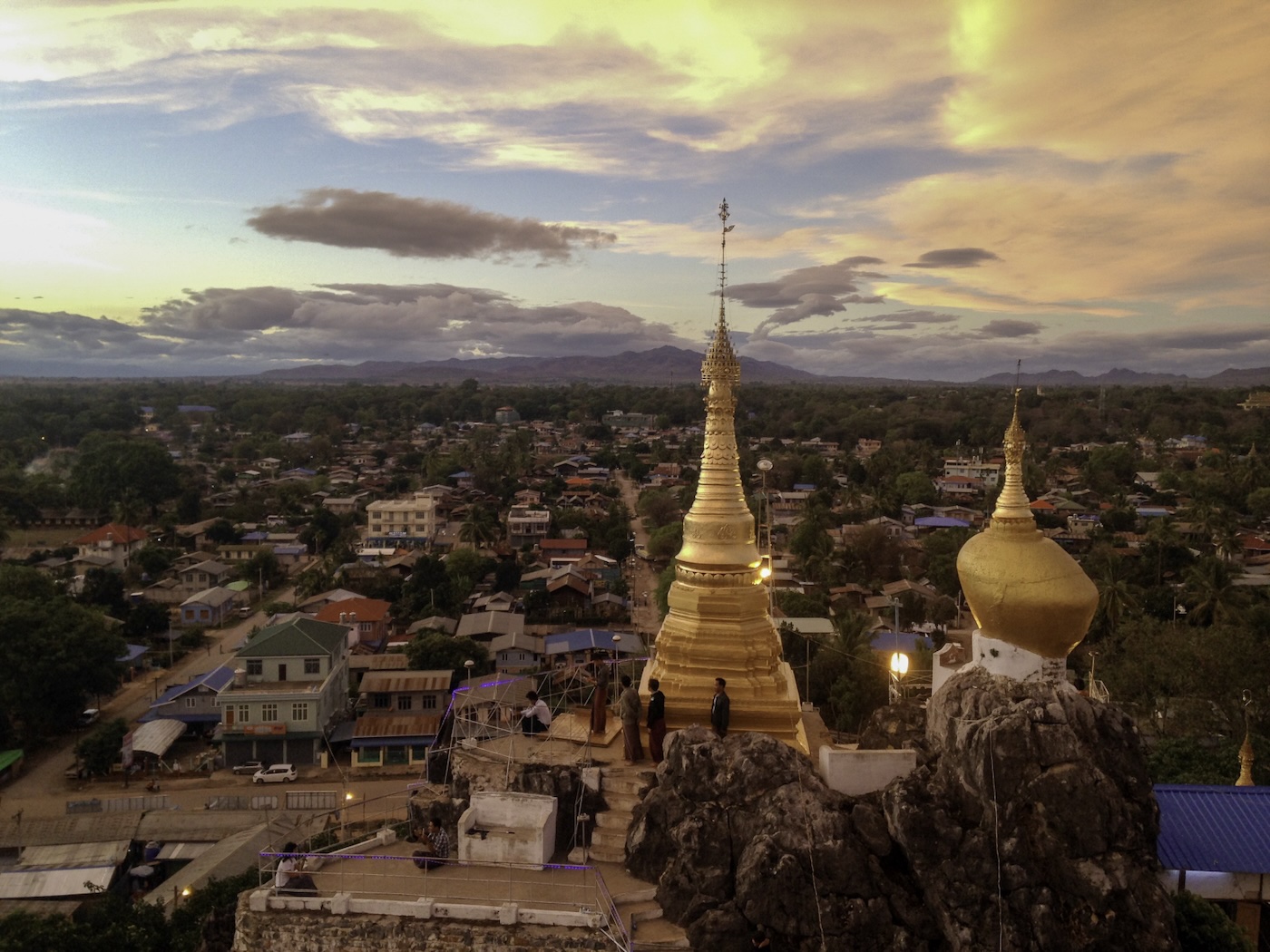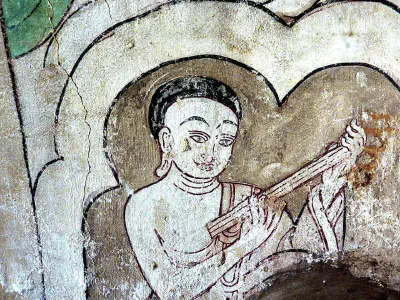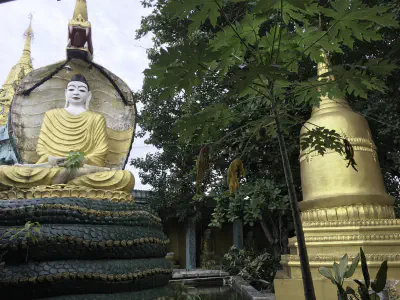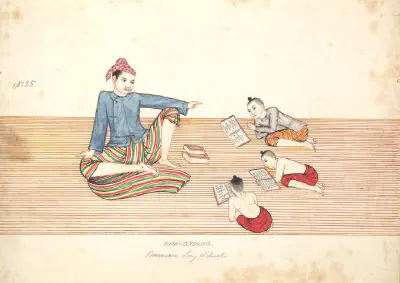I arrived in Yangon for the first time in January 2017, my life broken into pieces. The previous year had been punishing. In August, Elee, my partner of thirteen years, died of breast cancer. Before her death, we talked about what I would do after. I said I didn’t know. ‘You should get away,’ Elee said. ‘Once everything has settled down, you should get away.’
And because Elee’s advice was always good, that’s what I did. The week after Elee died, I saw a job advertised in Myanmar. I had never been to Myanmar before, and knew very little about it. But it seemed as good a place as any to rebuild my life, so I sent off an application. A few weeks later, I was offered the job, teaching humanities in a postgraduate institute. I accepted the job and bought myself a teach-yourself guide to the Burmese language. For my final few of months in the UK, I spent hours in coffee shops, reading books about Myanmar, struggling to get my ears and mouth around the sounds of the language: the strange music of unfamiliar consonants and creaky tones.
In January the following year, I left my home and cat in the care of some friends, and I flew to Yangon. A couple of days later, still jet-lagged and awash with grief, I was sitting in front of my new students. I was terrified I had made a wrong decision. I thought that here among strangers, I might drown in grief.
Club Tropicana
But it didn’t happen like that. I settled into Yangon fast. Life in Myanmar suited me. I found a regular breakfast spot: a tea-stall around the corner from my apartment. The owner had spent much of his life at sea, as a cook working on merchant ships. His English was broken, but he could do two things well: he could swear with eye-watering skill, and he could sing word-perfect renditions of 80s pop songs. In the mornings, I sat at the low tables of his tea-stall under the tarpaulin and drank hot, sweet Burmese tea. I jotted notes in my notebook for my morning’s classes, and the tea-stall owner sang snippets of Club Tropicana.
I taught all morning. My students were wise and fierce and kind in equal measure. They fizzed and crackled with ideas. They challenged me. We laughed a lot, and I felt welcomed and at home. Between classes, I sat in the office, watching the black kites circling above the flyover as they looked for prey. Sometimes I cried because the grief was still new. I tried not to let my colleagues see. I didn’t want to alarm them.
After my classes, I was free to wander the city. I walked for miles on end, letting the grief settle, getting a sense of how it was going to shape me. I fell in love in Yangon, with its temples and pagodas, its cafés and beer stations, with the crumbling colonial-era elegance of the downtown area and the city’s ragged and boisterous parks. I bought myself a longyi, the Burmese sarong. When I wore it, I felt more at home, and feeling more at home, my Burmese seemed to improve.
In the evenings, I bought fried rice from the cart in the marketplace and took it back to my apartment to eat alone. It was, I concluded, the best fried rice in the world. I prepared classes for the next day. Sometimes I drank a beer or a whiskey. Then I cried myself to sleep.
In the weeks that followed, I got to know Myanmar better. My students were excellent commentators on the country’s history and troubles. And as I talked to my students, it became apparent how much Myanmar was coming to terms with trauma of its own. Only six years before, five decades of military rule had ground to an end with the coming of democracy. It left the country scarred and broken. And behind that trauma was yet another trauma: the trauma of colonial British misrule, which left behind a legacy of division.
The legacy left by the British was felt most strongly in the seemingly intractable armed conflicts that had rumbled on ever since independence. In every corner of Myanmar, the Burmese army, the Tatmadaw, was waging war on a bewildering array of Ethnic Armed Organisations—or EAOs as they were called. I tried to get a handle on the politics. I attended talks on the political problems facing Myanmar. I picked my way through forests of acronyms, trying to make sense of it all. Meanwhile, in Rakhine state, the army was committing systematic human rights abuses against the Rohingya Muslim minority.
But in this brokenness, Myanmar gave me something I needed: it gave me hope. Few of the news reports on Myanmar ever mentioned the country’s rich, fearless cultural scene. I attended poetry events in English and Burmese. I heard talented young poets who wrote bravely about politics, about gender, about racial discrimination. Yangon had an audacious performance art world, where feminist performance artists challenged traditional social norms. Meanwhile, politically-engaged radical Punk activists—in Yangon, they called them lan thaye, or ‘street ghosts’—ran street schools for homeless kids, and headed up the Food not Bombs campaign. During those months in Myanmar, I met film-makers, writers, musicians, activists who ran their own grassroots organisations, community educators. And I came to see that Myanmar was a place where change seemed possible, even in the face of a broken past. There was an urgency to all this creativity. My Burmese friends knew what was at stake. Only six years old, Myanmar’s fledgeling democracy was a fragile thing, something that seemed as if it might be snatched away at any moment. Back in 2017, there was the sense that the future wasn’t assured, that military rule might return at any moment.
In the summer, the semester came to an end. I prepared to fly back home. At the graduation ceremony, I gave a speech. I told my students how, thanks to them, I had fallen in love with Myanmar. I said that I hoped this first visit would be only the first of many. I didn’t talk about the grief I had carried to Yangon, and how their spiritedness and creativity in the face of brokenness had helped it begin to heal. I still didn’t have the courage to talk about all that. But as I spoke — I don’t know if my students noticed or not — I found myself choking back tears of gratitude. Because it was only then, as I was preparing to leave, that I realised how over those last five or six months, in this country of brokenness and grief and possibility, I had managed to put my own life back together. Backstreets in Yangon. Photograph by the author © Will Buckingham 2019
A new coat of paint
After arriving back in the UK, I plunged back into life at home. It felt good to reconnect. The cat was glad to see me. And I had no immediate intention of returning to Myanmar, although I did my best to keep up my Burmese language. I started a new project with a fellow writer, Hannah Stevens, working on projects exploring writing and social justice. The following year, an opportunity came up for us to work on an eight-month residency in the same graduate institute I had worked before. I jumped at the possibility.
Hannah and I moved back into the same apartment where I had lived before. Things felt different this time around: the trauma of loss was further away. I had managed to wrestle my grief into some kind of shape. It was good to have a new project to work on, to be thinking about the future. Once we had settled in, we caught up with my old friends and former students, and I got a sense of how things had changed since I had been away. ‘Things have changed so fast since you were last here,’ my friends said. ‘Do you even recognise Yangon?’
But I did recognise Yangon. Things in my small corner of town were much was the same as before. The man with his fried rice cart was still there. His fried rice was still the best in the world. The tea-stall had closed, and the singer of Club Tropicana had gone. But in compensation, another tea-stall had opened nearby, and the tea was equally good. There was also a new modern-style café in the neighbourhood, a sign of creeping gentrification, serving decent coffees and Singapore-style food. It felt good to be back, to be wearing a longyi again, and to be picking up the threads of the language I had started to forget.
But I knew what my friends were getting at. The city was developing fast. Buildings were going up almost every day. The air was becoming more polluted. A haze hung over the rooftops. At sunset, it turned beautiful colours of red. The traffic was worse than I remembered. The taxi-drivers corroborated this, grumbling as they chewed on betel-nut and idled their engines in traffic jams.
But for all this Yangon was still lovably Yangon. And besides, not all the changes were bad. Internet and phone services were more stable. The electricity didn’t give out quite so often. When it did, we could take refuge in the new café, where they had a generator, and drink good quality coffee.
In terms of politics, things had shifted too. The repression of Rohingya communities in Rakhine had intensified. The UN called it ethnic cleansing. Aung San Suu Kyi, whom many outside Myanmar had once held up as a moral exemplar, responded to questions about the Rohingya with silence or with impatience. Elsewhere in Myanmar, the conflicts between the Tatmadaw and the various EAOs continued intractably, as they always had done.
But after a few weeks, I noticed that there was something new in the air. There was a new confidence. Gone was the sense that this was a country always a moment away from falling back under military rule. It was not that everything was now okay. It wasn’t. My Burmese friends were well aware of the magnitude of the problems they faced. But when they talked about the future, they talked about it as if it was something they genuinely had a stake in, as if it was something that could be fashioned, with enough creativity and commitment. We had fewer conversations about the return of the military, about how all this could be snatched away. And in 2019, it seemed as if the gravitational pull of the past had weakened, and with this weakening came a sense that a different future was possible.
For the next eight months, Hannah and I taught classes on writing and storytelling, on activism and on how writing can help bring about change. The students who attended the classes were diverse: former political prisoners, journalists, academics, college students, doctors. We wrote and shared stories together, and these brilliant, skilled, insightful writers cemented the growing hope I had for Myanmar’s future. The problems were still vast, but it seemed as if Myanmar had turned the corner, and wherever it was headed, it was not going to revert to its troubled, broken past. When Hannah and I left Myanmar, heading back to work on projects in Europe, it was with the sense that Myanmar’s future was going to offer more than its past. And we hoped to be back some time soon.
The worst of news
Then last night, we got a message from a friend who had attended one of these classes. There were rumours of a coup in the offing, she said. I sent a reply, saying I had these rumours in the papers a few days ago. But the last news article I had read said a coup was unlikely, and it seemed hard to imagine things coming to that. So we exchanged a few messages, and then I went to bed.
And then this morning, we woke to the worst of news. In the night, refusing to accept the result of last November’s elections, the Tatmadaw launched a coup. Spuriously claiming electoral fraud, the army took over direct rule of Myanmar. Internet and phone services were down. So too were ATMs and TV networks. There were tanks on the streets. The army had detained government ministers and officials, including Aung San Suu Kyi. Later in the morning, a friend who managed to get online posted a video of military trucks careening through the empty streets of Yangon, cheering in celebration and waving Burmese flags.
All day, I’ve been watching the news unfold. And I’ve been trying not to succumb to despair. I’ve been thinking about my wise, fierce, kind former students in Myanmar. I’ve been thinking about their creativity, their talent, their ferocious brilliance. I’ve been thinking, too, about the singer of Club Tropicana, and the man who makes the best fried rice in the world. And I’ve been thinking about how they all deserve so much better than this.
So this is my love letter for Myanmar, and to my friends in Myanmar to whom I owe so much. Myanmar helped me come to terms with my own grief. Now I am grieving for Myanmar. But if one thing gives me hope, it is this: the courage and creativity I knew when Myanmar was my home cannot be held back forever. And while this courage and creativity endure, however broken the world seems, it can still be mended.
Image © Will Buckingham



